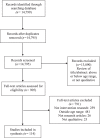What is the state of children's participation in qualitative research on health interventions?: a scoping study
- PMID: 35659206
- PMCID: PMC9166159
- DOI: 10.1186/s12887-022-03391-2
What is the state of children's participation in qualitative research on health interventions?: a scoping study
Abstract
Background: Children are the focus of numerous health interventions throughout the world, yet the extent of children's meaningful participation in research that informs the adaptation, implementation, and evaluation of health interventions is not known. We examine the type, extent, and meaningfulness of children's participation in research in qualitative health intervention research.
Method: A scoping study was conducted of qualitative published research with children (ages 6-11 years) carried out as part of health intervention research. Following Arksey and O'Malley's scoping study methodology and aligned with the PRISMA-ScR guidelines on the reporting of scoping reviews, the authors searched, charted, collated, and summarized the data, and used descriptive and content analysis techniques. Ovid MEDLINE was searched from 1 January 2007 to 2 July 2018 using the keywords children, health intervention, participation, and qualitative research. Study selection and data extraction were carried out by two reviewers independently.
Results: Of 14,799 articles screened, 114 met inclusion criteria and were included. The study identified trends in when children were engaged in research (e.g., post-implementation rather than pre-implementation), in topical (e.g., focus on lifestyle interventions to prevent adult disease) and geographical (e.g., high-income countries) focuses, and in qualitative methods used (e.g., focus group). While 78 studies demonstrated meaningful engagement of children according to our criteria, there were substantial reporting gaps and there was an emphasis on older age (rather than experience) as a marker of capability and expertise.
Conclusions: Despite evidence of children's meaningful participation, topical, geographical, and methodological gaps were identified, as was the need to strengthen researchers' skills in interpreting and representing children's perspectives and experiences. Based on these findings, the authors present a summary reflective guide to support researchers toward more meaningful child participation in intervention research.
Keywords: Childhood studies; Children; Health interventions; Implementation research; Meaningful participation; Scoping review.
© 2022. The Author(s).
Conflict of interest statement
None declared.
Figures
References
-
- The Qualitative Research in Implementation Science (QUALRIS) group. Qualitative methods in implementation science. National Institutes of Health. https://cancercontrol.cancer.gov/sites/default/files/2020-09/nci-dccps-i....
-
- Njelesani J, Gibson BE, Nixon S, Cameron D, Polatajko HJ. Towards a critical occupational approach to research. Int J Qual Meth. 2013;12:207–220. doi: 10.1177/160940691301200109. - DOI
-
- Spray J. Towards a child-centred public health: lessons from rheumatic fever prevention in Aotearoa, New Zealand. Child Soc. 2020;34:552–566. doi: 10.1111/chso.12389. - DOI
-
- Bluebond-Langner M. The private world of dying children. Princeton: Princeton University Press; 1978.
Publication types
MeSH terms
LinkOut - more resources
Full Text Sources
Medical
Miscellaneous



